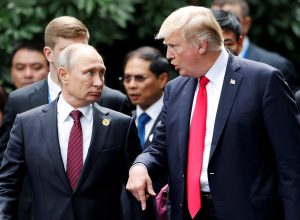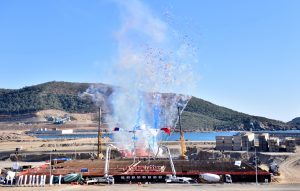
By Doina Chiacu and Andrew Osborn
WASHINGTON/MOSCOW (Reuters) – U.S. President Donald Trump and Russian President Vladimir Putin will hold their first summit on July 16 in Helsinki, a renowned venue for Cold War diplomacy, with nervous U.S. allies in Europe and Russia skeptics looking on.

FILE PHOTO: U.S. President Donald Trump and Russia’s President Vladimir Putin talk during the family photo session at the APEC Summit in Danang, Vietnam November 11, 2017. REUTERS/Jorge Silva/File Photo
The Kremlin and the White House simultaneously announced the place and date of the summit a day after striking a deal on holding the meeting following a visit to Moscow on Wednesday by U.S. national security adviser John Bolton.”The two leaders will discuss relations between the United States and Russia and a range of national security issues,” the White House said in a statement similar to one released by the Kremlin.
Trump will meet Putin after attending a July 11-12 summit of NATO leaders and making a visit to Britain. The summit’s date will give Putin a chance to attend the July 15 closing ceremony of the soccer World Cup which his country is hosting.
The two leaders have met twice before on the sidelines of international gatherings and spoken at least eight times by phone. They have also made positive comments about each other from time to time with Putin praising Trump’s handling of the economy.
Their summit could irritate U.S. allies however who want to isolate Putin, such as Britain, or countries like Ukraine who are nervous about what they see as Trump’s overly friendly attitude toward the Russian leader.
It is also likely to go down badly among critics who question Trump’s commitment to the NATO alliance and who have been concerned about his frictions with longtime allies such as Canada and Germany over trade.
LOW EXPECTATIONS
Trump has long expressed a desire for better relations with Moscow, even as Washington tightens sanctions, and the Kremlin has long pushed for a summit.
It made no secret on Wednesday of its delight that such a meeting had finally been agreed with Kremlin aide Yuri Ushakov saying the two men were likely to talk for several hours. He spoke of a possible joint declaration on improving U.S.-Russia relations and international security.
Trump congratulated Putin by phone in March after the Russian leader’s landslide re-election victory.
But since then, already poor ties between Washington and Moscow have deteriorated over the conflict in Syria and the poisoning of a former Russian spy in Britain which sparked big diplomatic expulsions in both countries.
Expectations for a summit are therefore low.
A special counsel in the United States has indicted Russian firms and individuals as part of a probe into possible collusion between Russia and Trump’s 2016 presidential campaign. Trump denies wrongdoing and calls the investigation a “witch hunt.”
The U.S. intelligence community’s conclusion that Moscow sought to interfere in that campaign to tilt the election in Trump’s favor has also been hanging over relations with Russia since Trump took office in January last year.
Bolton told reporters in Moscow on Wednesday he expected Russian interference in U.S. politics to be discussed at the summit and said he did not rule out Trump discussing Russia rejoining the Group of Seven industrialized countries to make it the G8 again.
After Trump and Putin met briefly in Vietnam in November 2017, Trump was criticized in the United States for saying he believed Putin when the Russian president denied accusations that Russia meddled in the 2016 election.
In a Twitter post on Thursday before the Helsinki meeting was announced, Trump again appeared to cast doubt on Russian involvement. “Russia continues to say they had nothing to do with Meddling in our Election!” he wrote.
In Washington on Wednesday, Trump listed Syria and Ukraine as being among the many subjects he would discuss with Putin.
(Additonal reporting by Denis Pinchuk in Moscow, Editing by Toby Chopra and Frances Kerry, William Maclean)









